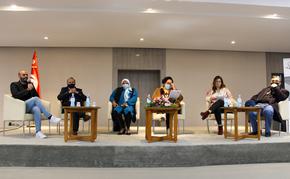As societies have woken up to the reality that the Internet can be a platform for hate speech that leads to violence, a Canadian Parliament committee is studying this phenomenon and gleaning insights from several faith communities, including the Baha’is.
The House of Commons Standing Committee on Justice and Human Rights recently began its study of online hate speech, bringing together for a hearing on 11 April representatives of several religious and other civil society organizations to discuss ways of combating the issue.
“Young people need access to education that teaches them from the earliest years that humanity is one family,” explained Geoffrey Cameron, representing the Baha’i Community of Canada’s Office of Public Affairs. “They require education and mentorship that goes beyond a simplistic condemnation of hatred or a set of dos and don’ts regarding their online activity.”
The widespread proliferation of social media has given hate speech a larger audience online. This has led to the glorification of violence and hateful actions, several speakers at the committee hearing said. For example, the first of the two Christchurch mosque terrorist attacks was live streamed on Facebook for 17 minutes, and many violent extremists have been inspired by online discussion forums and social media posts, speakers noted.
Dr. Cameron highlighted the need for educational processes that help young people navigate a polarized and deceptive information environment online: “Youth need help to develop a strong moral framework within which they can make decisions about their online activities, like which content they choose to share and consume, and how they use their powers of expression when communicating with friends and strangers online.”
The significance of education, central to the Baha’i contribution at the hearing, was noted by others, including the committee’s vice chair, Member of Parliament Tracey Ramsey. “I think a core piece of what we’re looking at here is (for) people (to) understand how to identify what is a legitimate piece of media and what is something that is sharing perhaps hateful messages on the Internet and how to distinguish between those things,” Ms. Ramsey said.
The discussion also explored the tension between respecting freedom of expression and regulating hate speech online as well as the prospect of technical solutions to reporting and monitoring hate speech or designating legitimate news sources.
The hearing brought to light a growing awareness that governments and citizens cannot be naive about online technologies and their impacts on society. Questions about the value systems embedded in different online technologies, about privacy, misinformation, and hate speech, and about social isolation and increased risk to vulnerable populations, are among many concerns being explored by a wide range of social actors such as governments, educators, civil society, and individuals.
Amid this complex landscape, helping young people to develop a moral framework to navigate online content and their contributions is an important dimension that should not be overlooked, Dr. Cameron added.

















Comments
Sign in or create an account
Continue with Facebookor